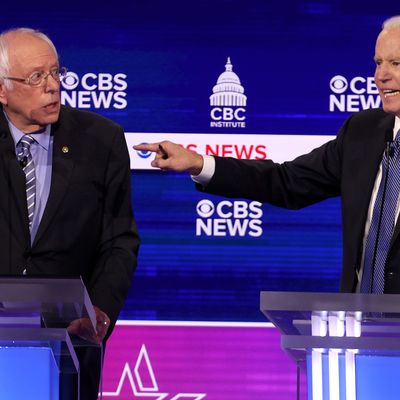
In the wee hours of the Wednesday after Super Tuesday, most of the primary winners and losers have been determined, even if delegate totals aren’t. Maine and Texas, two states where Joe Biden and Bernie Sanders were very close, have now been called for Uncle Joe. A lot of votes are still out, and the weird dynamics of heavy voting-by-mail in California mean that Bernie Sanders’s big lead there in initial returns may erode over time, just as (ironically) Hillary Clinton’s did in 2016.
But the big picture is very clear, even if the ultimate Democratic nominee is not. Thanks to Joe Biden’s huge, speedy, and maybe even unprecedented surge from the point of near-oblivion, the contest that so recently had observers complaining about crowded debate stages and un-winnowed losers is very likely about to become a two-candidate race. All the talk of a contested convention is probably moot now. And like the 2016 two-candidate race, the competition between Bernie Sanders and Joe Biden could divide Democrats not just ideologically but by race and ethnicity, and especially by age.
This is not, to be sure, a rerun of 2016. While Hillary Clinton was the front-runner from beginning to end four years ago, her tormenter, Bernie Sanders, and her centrist-establishment successor, Joe Biden, have changed sides as front-runner and challenger, and for a brief time both looked up in the polls at Elizabeth Warren. As recently as three weeks ago, after the New Hampshire primary, Sanders was riding high while Biden sank to fifth place, behind two younger centrists, Pete Buttigieg and Amy Klobuchar, who were auditioning to replace him, even as all three of them were in danger of being overshadowed by Michael Bloomberg, who was rising rapidly in Super Tuesday polls after spending insane amounts of money on ads and staff to win them.
What happened next was breathtaking. Even as Sanders easily won another contest in Nevada, Biden’s centrist rivals began to get out of his way in a virtual demolition derby, with Buttigieg and Klobuchar showing the limits of their white-college-educated-only base of supporters as the landscape grew more diverse, and Bloomberg putting in one of the worst debate performances in living memory. By the time Biden won in his long-time best state South Carolina by a surprisingly large margin, he was back in the game with a vengeance.
The speed and size of Biden’s bounce was amazing, though. Just before South Carolina voted, FiveThirtyEight projected that a large Biden win there might put him within 150 delegates of Sanders. That was then. This is now, per the Cook Political Report’s David Wasserman:
If you factor in Biden’s big disadvantage among early voters who didn’t see Bloomberg wilt in the heat of Las Vegas or Uncle Joe blossom in the warmth of South Carolina, he’s certainly the candidate with momentum. Again citing a FiveThirtyEight data point, Biden over-performed its poll-based projections in 11 of the 14 Super Tuesday states (all but California, Colorado, and Utah — all big early-voting states).
Of equal importance, the wheels fell off for Bloomberg, who appears to have salvaged viability to win delegates mostly in states with abundant early voting. But late deciders didn’t like him. In Texas, for example, according to exit polls, Bloomberg won an estimated 24 percent of the vote among those who decided in February, a percentage that dropped into the low teens among those who decided in the last few days. Biden won nearly half of late deciders in Texas, trouncing both Bloomberg and Sanders. And even in California, Sanders’s best state other than Vermont, where Bloomberg may win delegates, Biden ran even with Bernie among those who decided in the last few days, while Bloomberg’s vote share plunged toward single digits. In the primary-within-a-primary between Biden and Bloomberg, Biden won in stride and appears to be gaining momentum, which may indicate an early withdrawal from the race by Hizzoner.
It’s probably curtains as well for Elizabeth Warren, the one-time front-runner who did manage to match or beat Bloomberg in some Super Tuesday states, but who suffered the calamity of a third-place finish in her home state of Massachusetts (behind, astonishingly, Biden as well as Sanders). It’s hard to believe she can overcome that rebuke from the voters who know her best.
And so, Democrats will likely choose between two late-septuagenarian white men who have both been around seemingly forever, and who both have done relatively well in trial heat polls versus Donald Trump. They are thought to represent some sort of ideological battle for the soul of the Democratic Party, but mostly differ in terms of the demographics of their supporters, with Biden winning older voters and African-Americans while Sanders wins younger voters and Latinos. The landscape ahead is uneven enough that despite Biden’s recent momentum and Establishment backing and Sanders’s grassroots fundraising base and rock-solid core of supporters, it could go either way.






























